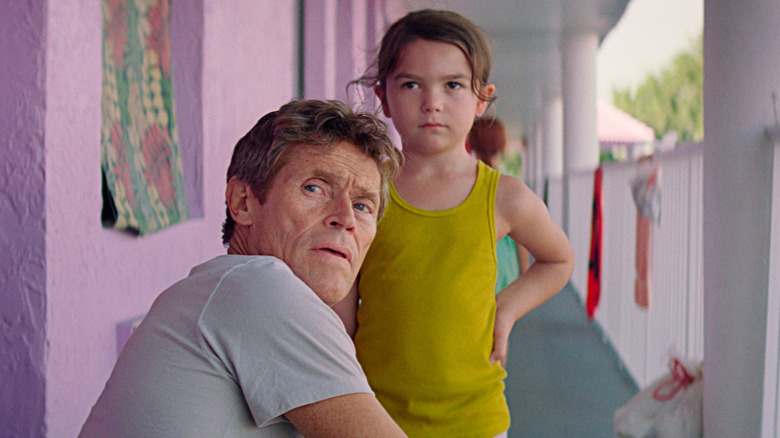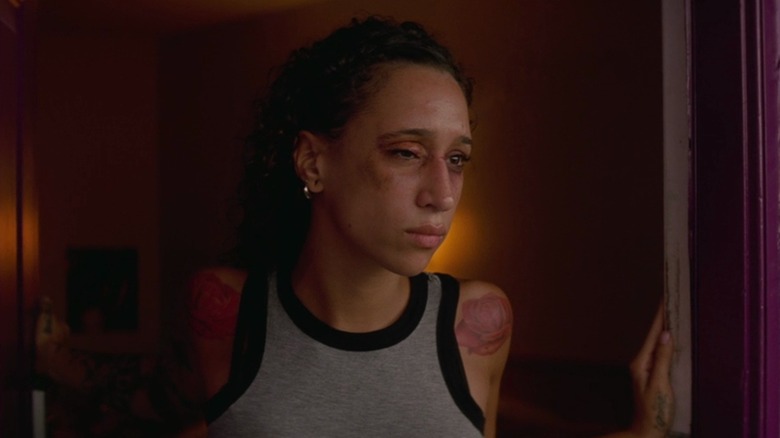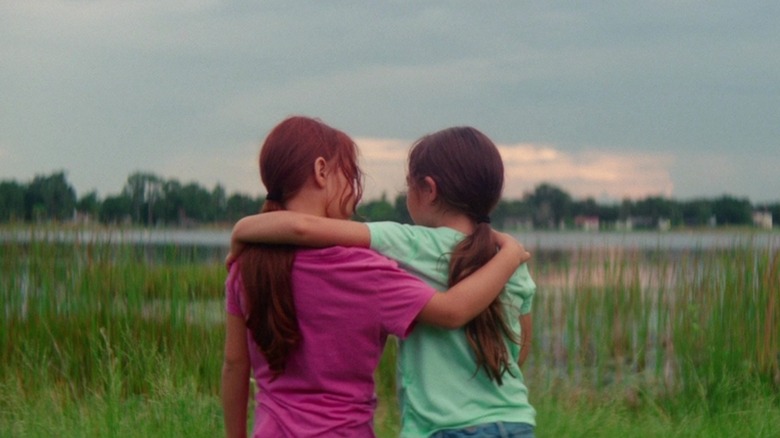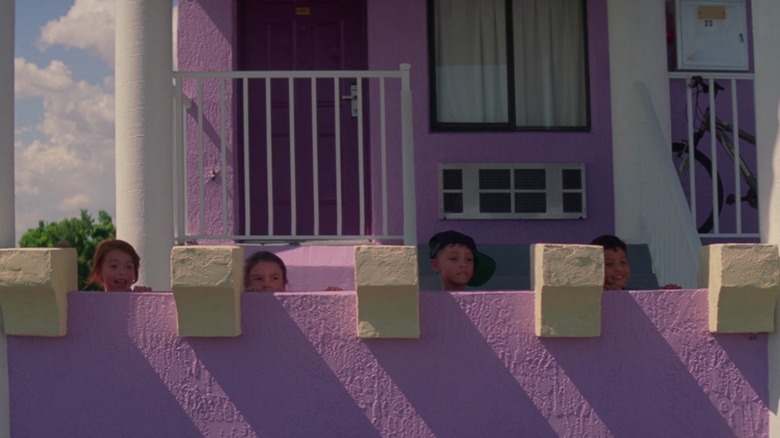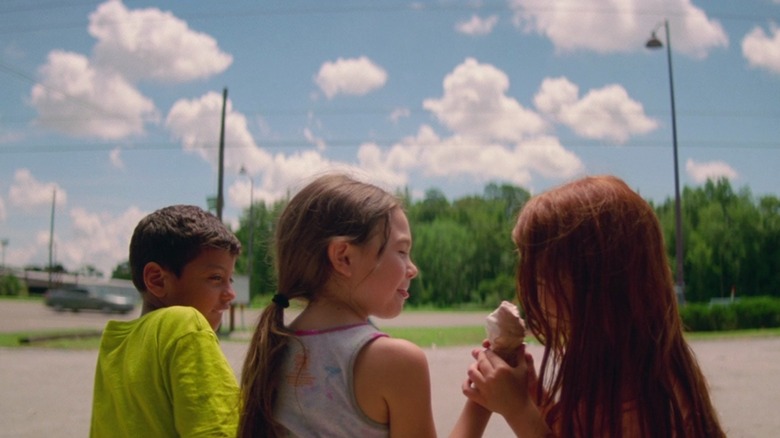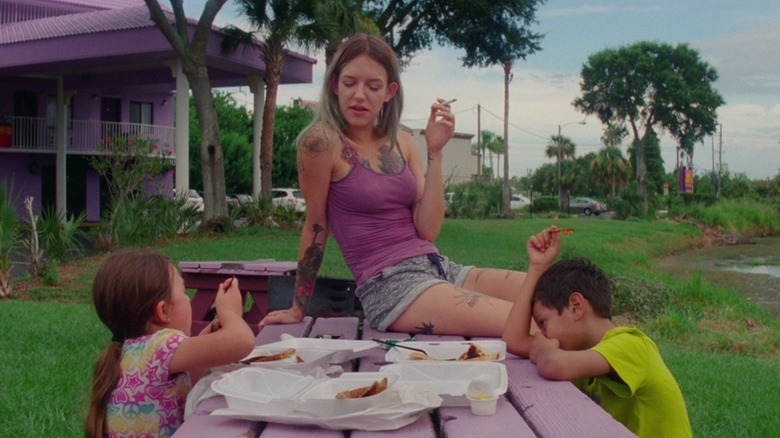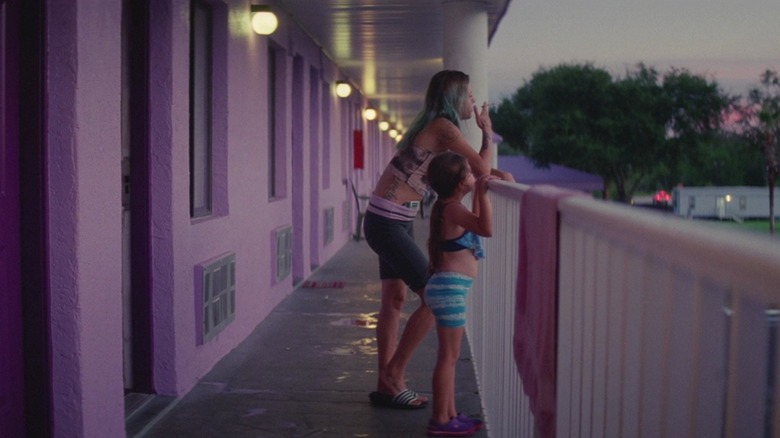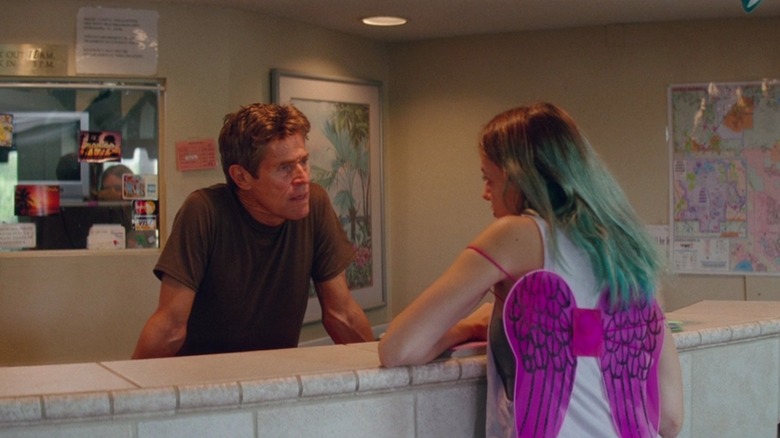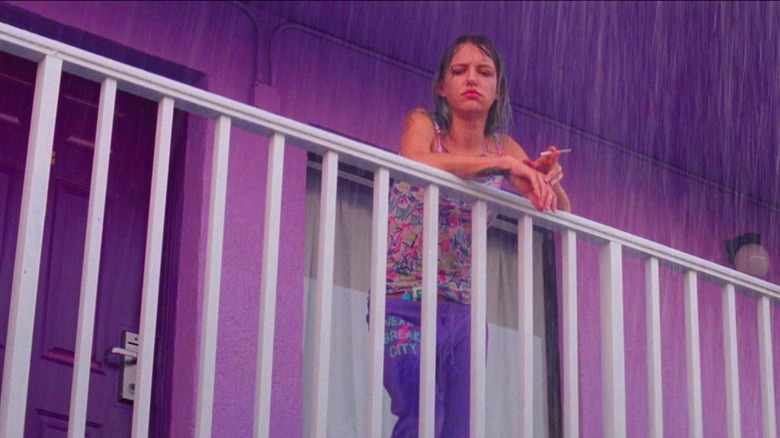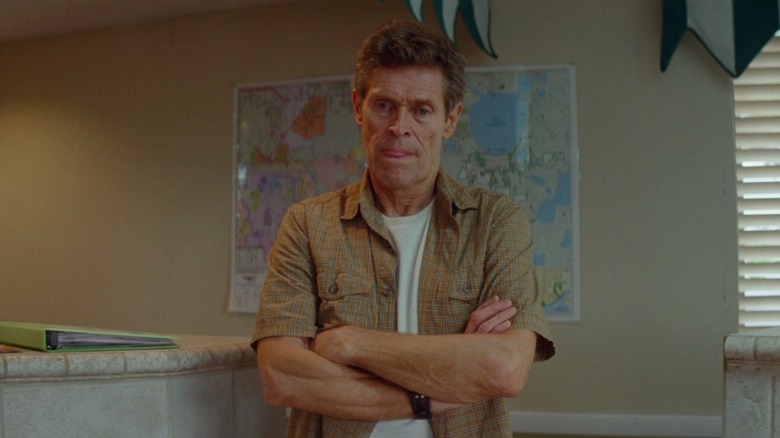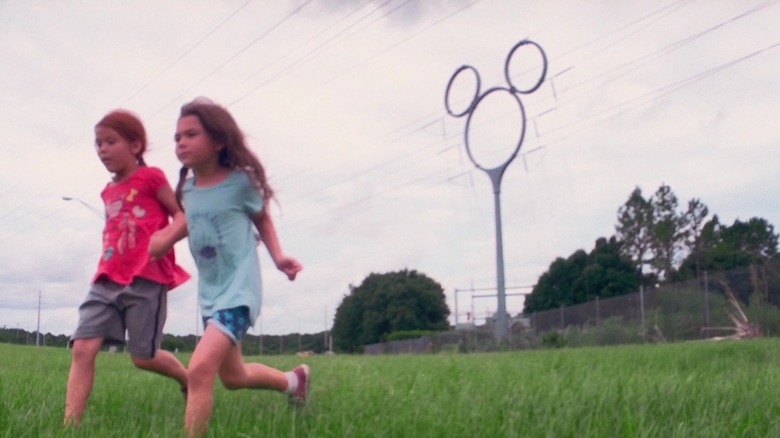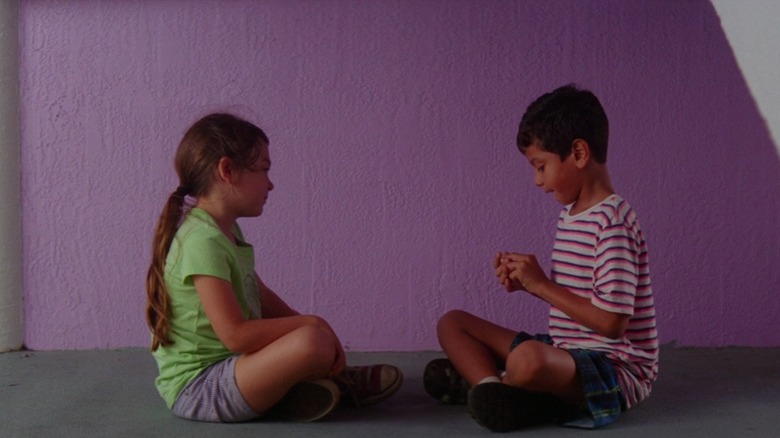The Florida Project Ending Explained
Sometimes a movie's ending leaves you confused because of a complicated plot or a surprising twist, like the mind-bending ending of "Inception." Other times, it will demand further explanation because it's so surreal, like the trippy ending of "Beau Is Afraid." And then you have "The Florida Project." This movie barely has any plot, and it's actually quite easy to follow. Even so, the film's ending is rather ambiguous, and the story is loaded with layers of deeper meaning.
Even a relatively simple movie like this one will leave you with some unanswered questions. Like, why is the movie called "The Florida Project," of all things? And who really called the social workers on Halley? Most importantly, you're probably wondering whether the film's bittersweet ending is real or just taking place in the imagination of the little girl at the heart of this sad tale. It's time to enter the Magic Castle Inn & Suites and explore the ending of "The Florida Project."
What you need to remember about the plot of The Florida Project
In "The Florida Project," six-year-old Moonee (Brooklynn Prince) lives with her mother Halley (Bria Vinaite) in Kissimmee, Florida, not far from Walt Disney World. Halley can't afford permanent housing, so instead she lives day-to-day in a motel called the Magic Castle Inn & Suites. Along with the neighbors' kids Jancey (Valeria Cotto) and Scooty (Christopher Rivera), Moonee wanders the town unsupervised, playing in empty parking lots. Halley, who likely gave birth to Moonee when she was still a teenager and is practically a kid herself, is more focused on making sure her daughter has fun than giving her a stable home.
Although Halley has fallen behind on rent and can often be impulsive, the motel manager Bobby (Willem Dafoe) tries to help her out as much as he can. Still, Bobby can't help but notice that Moonee is starting to imitate her mother's reckless behavior. In a major turning point, Moonee, Jancey, and Scooty play in a condemned building and then set fire to it. When the kids' parents find out how close they came to getting hurt, Scooty's mother Ashley (Mela Murder) decides that Halley is a bad influence and tells him not to play with Moonee anymore. Halley is stung by this rejection, so she retaliates against Ashley by humiliating her at work and stomping in the middle of the night in hopes to wake Ashley. She even beats up Ashley in front of Scooty, and that's when Bobby realizes things have gone too far.
What happened at the end of The Florida Project?
The ending of "The Florida Project" kicks into motion after someone at the motel makes an anonymous call to the Florida Department of Children and Families (the DCF). When the DCF investigates Halley, they discover that Halley has been earning money by offering sexual services to clients in her motel room — all while her daughter was in the adjacent room, playing in the bathtub. This, along with Halley's other actions, convinces the authorities that Moonee would be safer if she was placed in foster care. Understandably, Halley lashes out against the DCF, but of course that changes nothing. Meanwhile, Bobby tries to gently break the news to Moonee and Halley — until it becomes too much for him and he needs to step away.
In the final scene, Moonee realizes that she is going to be taken away from her mother, so she breaks free from the social workers and runs to her friend Jancey. With tears streaming down her face, Moonee tells Jancey that she might never see her again, but she doesn't want to say goodbye. In response, Jancey grabs Moonee's hand and together they run, fleeing to the only place they can think to go: Walt Disney World, "The Happiest Place on Earth." Of course, it's ambiguous how much of this final scene is real, so viewers are left with the uneasy feeling that this is too good to be true. Either way, it's an ending guaranteed to make anyone cry.
What does the title of The Florida Project mean?
If you ever wondered about the real meaning behind this movie title, the phrase "The Florida Project" is a reference to the acres of cheap land that Walt Disney purchased in order to build Walt Disney World. Director Sean Baker explained to Laughing Place, "Also, the title is sort of a play on words, thinking about 'the projects' — you know, subsidized apartment buildings."
The title is meant to highlight the contrast between the wealthy tourists who visit Walt Disney World to have a good time, and the working-class families that live in the surrounding motels because they have nowhere else to go. Baker hoped to raise awareness about the kids living in poverty right next to "The Happiest Place on Earth." Moonee lives so close to Walt Disney World, yet her mother could never afford to take her there. Likewise, all the helicopters taking guests on aerial tours are nothing more than a background noise to Moonee, forever out of reach.
Nowhere is this gap made more apparent than the scene with the tourists who end up at the motel by mistake. The couple actually meant to make a reservation at a hotel in Walt Disney World's Magic Kingdom, and they're outraged when they end up at the Magic Castle Inn instead. These folks can't imagine staying in this place for just one night, much less comprehend that folks like Moonee and Halley might spend their entire lives there.
Why is Moonee so happy?
For such a tragic movie, "The Florida Project" is surprisingly uplifting, and this is because we see the world through Moonee's eyes. Cast in the glow of her youthful innocence, Moonee's run-down surroundings are transformed. The Magic Castle Inn might as well be an actual magic castle to Moonee. Meanwhile, a trek through a cow field becomes a safari. Since Moonee can't go to Walt Disney World and go on an actual safari at the Animal Kingdom attraction, she makes her own. In one scene, Moonee sits on a fallen tree and says, "Do you know why this is my favorite tree? 'Cause it tipped over. And it's still growing." Moonee may not realize it, but she has essentially just described herself. Much like the tree, she is growing in a place no child should have to grow, and yet she is still flourishing.
Moonee is blissfully blind to her depressing situation. For her, this blindness is not just an escape – it is the only way she can move forward. How else can she cope with her abject poverty and sometimes neglectful mother, except by looking for the bright side in everything? However, by the end of the movie, Moonee's rose-colored glasses begin to crack. That's why she runs away to Walt Disney World. When she can no longer find the silver lining in her situation, she flees to the only place that seems untouched by harsh reality.
Why does Halley see men while Moonee is in the bathtub?
To understand why Halley puts her daughter in this uncomfortable situation, we need to look at the chain of events that led to this point. It is partially the result of the choices Halley makes (such as her habit of burning bridges with everyone who tries to help her). However, Halley is also affected by societal factors beyond her control.
Early in the film, Halley is fired from her job as an exotic dancer after refusing to have sex with a client (something that wasn't part of the original job description). That means Halley won't qualify for government aid unless she gets a new job — no matter that she's applied for countless local jobs already and has been rejected each time. For a while, Halley tries to make money selling perfumes that she purchased wholesale, but tourists won't buy from her because they take one look at her and assume she's a scammer. With no other options, Halley begins earning money in the only way she knows how — by offering sexual services to clients in her own room.
Since Halley has driven away most of her friends, she has nobody to watch Moonee, so she decides the safest place for her daughter is in the bathroom. Ironically, Halley ends up right back where she started, because poverty is a vicious cycle. That's why, when the DCF tells Halley that she's not fit to be a parent, it may not be completely fair. Halley doesn't have the resources to give Moonee what she needs — and she probably never will.
Is Halley doing what's best for Moonee?
Although some critics claim that Halley is one of the worst parents in movie history, the truth is actually more complicated than that. Yes, Halley hitches a ride with a stranger (and takes two children with her), but she's just doing this because she wants to take the kids to see fireworks. And yes, she participates in sex work while her daughter is in the next room, but only because she has exhausted all other ways of providing for Moonee, and because this is arguably safer than letting Moonee roam around outside at night. Most of the time, Halley is well-meaning. However, sometimes she puts her own needs above her daughter's, like when she refuses to let Moonee play with Scooty because she still harbors a grudge against Scooty's mom.
While Halley cannot give Moonee what she needs, and she doesn't always have Moonee's best interests at heart, she clearly loves Moonee. When you consider that Halley is little more than a child herself, it's easier to understand that she's not doing what's best for Moonee, though she is at least doing the best she can. "Never once does Halley take it out on her daughter," Bria Vinaite, the actor who plays Halley, told the Los Angeles Times. "Never once did she let the stresses [of adulthood] affect her relationship with her." Halley is just trying to shelter her daughter from the harsh realities of their life, because she wants to let Moonee enjoy her childhood. And, given Halley's limited resources, some would argue that Halley does a pretty impressive job.
Who called the DCF on Halley?
"The Florida Project" never officially confirms who brought the DCF to Halley's door, though it certainly drops plenty of hints. Many viewers believe Ashley did it. After all, that's who Halley automatically assumes is responsible. Since Halley physically assaulted Ashley in front of Ashley's young son, we can't really blame her if she decided to report Halley. When the social workers take Moonee to say goodbye to Scooty, you'll notice that Ashley hugs Moonee for a long moment, and this gesture could be read as an apology. However, it's far more likely that Bobby staged the intervention.
Bobby shows concern for Moonee, and he is the only one who has access to CCTV footage that proves Halley is seeing clients in her room. Bobby tries to ease Moonee and Halley through the process, yet he may also be trying to ease his own guilt. Right when the truth starts to dawn on Moonee, Bobby slips away to smoke a cigarette, like he is afraid to be around when everything blows up. You can tell by the haunted look in his eyes that he feels responsible for this. In one of our last glimpses of Bobby, we see him telling another renter that he plans to fix the washing machines. His tone is apologetic, and you can't help but wonder if he is apologizing to this random character because he can't bring himself to apologize to Halley.
When does reality sink in for Halley?
Halley fights the DCF's decision to take her daughter away, refusing to admit that she made any mistakes. However, by the end of the movie, Halley is able to accept on some level that Moonee's life needed to change, and she handles this realization with surprising maturity. At first, Halley is bitter, blaming Ashley for calling the social workers. She goes out of her way to stomp on the floor above Ashley's apartment in the middle of the night to wake Ashley, even though this also means waking Moonee. Yet, as she leans on her balcony, shooting Ashley the stink eye, Halley seems to realize something. She decides that if her days with Moonee are numbered, she's not going to spend them moping.
Putting her personal grudges aside, Halley plays with her daughter, coaxing Moonee out into the rain to play tag with her. Even when she is cleaning her apartment before the next DCF visit, Halley tries to turn it into a fun game for Moonee. On the day the DCF comes for Moonee, Halley treats her daughter to a buffet; she watches with a heavy heart as Moonee stuffs her face, oblivious of what is about to come. When Halley returns to their room, all-too-conscious of the police car waiting to take Moonee away, she keeps her head high, because her dignity is all she has left.
Did Bobby make the right decision?
Bobby faces a dilemma at the end of "The Florida Project," and there is no easy solution. When he calls the DCF, Bobby is thinking of Moonee's well-being — not just for the remainder of her childhood, but for the rest of her life, because Halley is beginning to do damage to Moonee that cannot be easily undone. Halley has an immense influence on Moonee, and throughout the movie we see Moonee imitating her mother in all the wrong ways. She spits on strangers' cars and burns down abandoned buildings because she has no grasp of consequences. She even takes "swimsuit selfies" with her mother, unaware of the adult connotations behind them. If Bobby hadn't acted, Moonee would have grown up to be just like her mother; impulsive and unstable with no prospects for her future.
Of course, some viewers are skeptical that Moonee's life will be any better in foster care. After all, there is no guarantee that Moonee will end up with a healthy family. What's more, Moonee is leaving her friends and everything she knows behind, which is bound to traumatize her. Some have pointed out that if Bobby wanted to make sure Moonee had a safe home, he should have just adopted Moonee himself — but then, that's easier said than done, and Bobby already has his hands full looking after the other residents of the motel. Whether or not he made the right choice, Bobby will live with his decision for the rest of his life.
Is the ending scene real?
Unfortunately, Moonee's story probably doesn't end with her living happily-ever-after in "The Happiest Place on Earth." Observant viewers will notice that the scene in Walt Disney World looks drastically different from the rest of the movie. This is because Sean Baker actually switched mediums, filming the final scene on an iPhone (instead of 35mm film like the rest of the movie), which signals to viewers that we may be entering a fantasy sequence.
So it probably isn't real, at least not the way it's shown on-screen. Instead, this moment is just Moonee's way of coping with her trauma, spinning her tragic ending into something easier to swallow. In reality, maybe the authorities will finally catch up with Moonee in Walt Disney World. Or maybe the kids return home in defeat, after they realize they can't keep running forever. Or maybe Moonee and Jancey don't run away at all, and this entire scene happens in Moonee's head because she can't bear to think about what is really happening.
This ending note is even sadder than if the movie had just shown Moonee being taken away by the DCF, because it teases viewers and tugs at their heartstrings. Perhaps the ending of "The Florida Project" is a meta-commentary on the way audiences want a happy ending — even though, for real-life kids in Moonee's situation, a happy ending may simply not be possible. As a result, "The Florida Project" has one of the most powerful sad endings in cinematic history.
What has the cast and crew said about the ending of The Florida Project?
When asked about the somewhat ambiguous ending of "The Florida Project," the cast and crew has offered equally ambiguous answers. Willem Dafoe chose not to commit to any interpretation, telling the Los Angeles Times, "I'm going to leave that up to the audience to decide." Meanwhile, in an interview with The Hollywood Reporter, Sean Baker explained, "This is me saying to the audience, 'If you want a happy ending, you're gonna have to go to that headspace of a kid because, here, that's the only way to achieve it.'"
Brooklynn Prince, who plays Moonee, is torn about what to make of the ending. "My mom and dad think Moonee's sitting in the back of a cop car," she told the Los Angeles Times, adding that her parents believe that the part where Moonee and Jancey run away is only happening in Moonee's head. She added: "But I can't think about it that way because it makes me cry." Instead, Prince likes to believe that Moonee and Jancey get to spend time together one last time at Walt Disney World before Moonee gets taken to a foster home.
Understandably, while she doesn't necessarily believe it herself, Prince doesn't want to entirely rule out the possibility that Moonee gets a happy ending. "It could be anything you want," she said. "If you want Moonee to live in Disney World, she can live in Disney World. Maybe she's living at the ice cream parlor. She loves ice cream." And who wouldn't want an ending like that?
If you or someone you know may be the victim of child abuse, please contact the Childhelp National Child Abuse Hotline at 1-800-4-A-Child (1-800-422-4453) or contact their live chat services.
